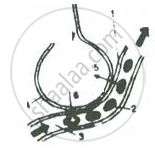Advertisements
Advertisements
प्रश्न
Given alongside is a diagrammatic sketch of a kind of part in human lungs.
Name the parts numbered 1-4

उत्तर
1: Thin walls of capillary;
2: RBCs (Red blood corpuscles);
3: Plasma;
4: Thin wall of the alveolus
APPEARS IN
संबंधित प्रश्न
Differentiate between the following pairs on the basis of the aspect given in the brackets.
Respiration and Breathing (Organs involved)
What are the functions of the following in breathing?
Abdominal muscles
Put a tick (✓) against the most appropriate alternative in the following statement.
In humans, taken in of the air through nostrils into the nasal cavity is called
Fill in the blank.
In human beings, the exchange of gases takes place in _____.
Fill in the blanks.
Sweat serves to excrete excess _________ and ________.
Define the following:
Sneeze Reflex
Name the following:
Miniature lungs.
Complete the following statement by choosing the correct alternative from those given below.
R.Q. for fat is ______.
Give the functions of the following:
Alveoli
Give the functions of the following:
Lecithin covering
Answer the following question.
A student observed that the cockroaches are killed for dissection by simply putting them in soap water. He inquired whether soap is so poisonous. Teacher said it is due to its peculiar respiratory system. How?
TV and ERV of an athlete are 500 mL and 1000 mL respectively. What will be his Expiratory Capacity if the RV is 1200 mL?
Assertion: Human being has a complex respiratory system.
Reason: Human skin is impermeable to gases.
Carefully study the diagram of the human respiratory system with labels A, B, C and D. Select the option which gives correct identification and main function and /or characteristic.

Arrange in the correct sequence
Trachea → Bronchi → Pharynx → Lungs → Larynx → Nasal cavity → Nostrils → Bronchiole → Alveolus
Which of the following is NOT included in conducting part of the respiratory system?
Lungs have large number of narrow tubes called
Which of the following statements is incorrect regarding respiratory system?
